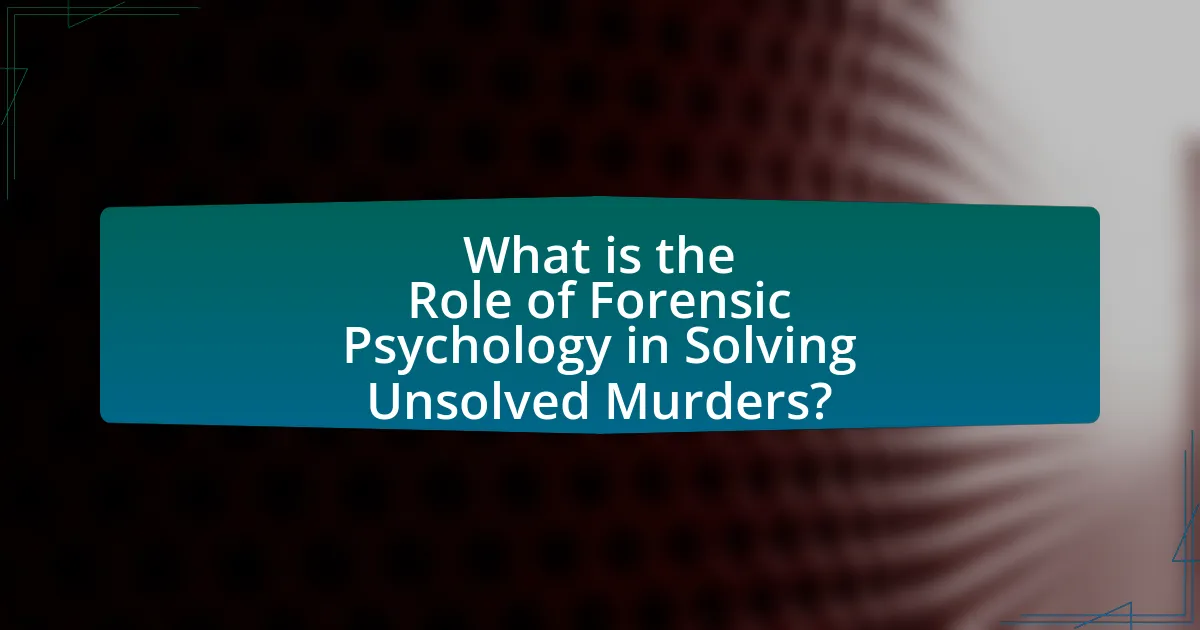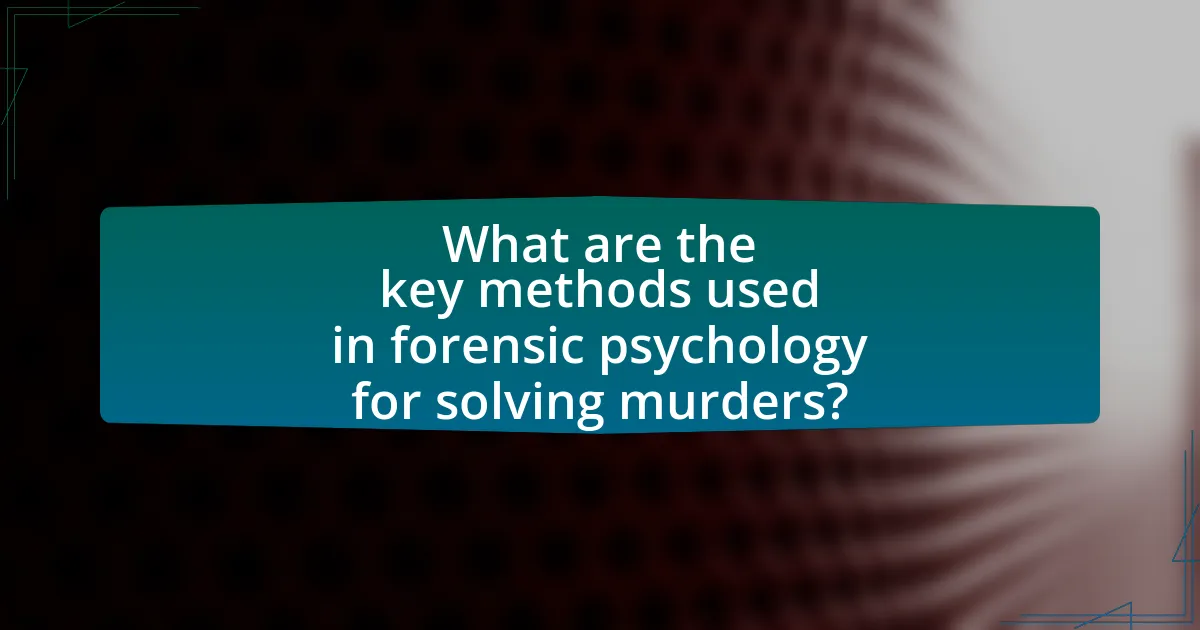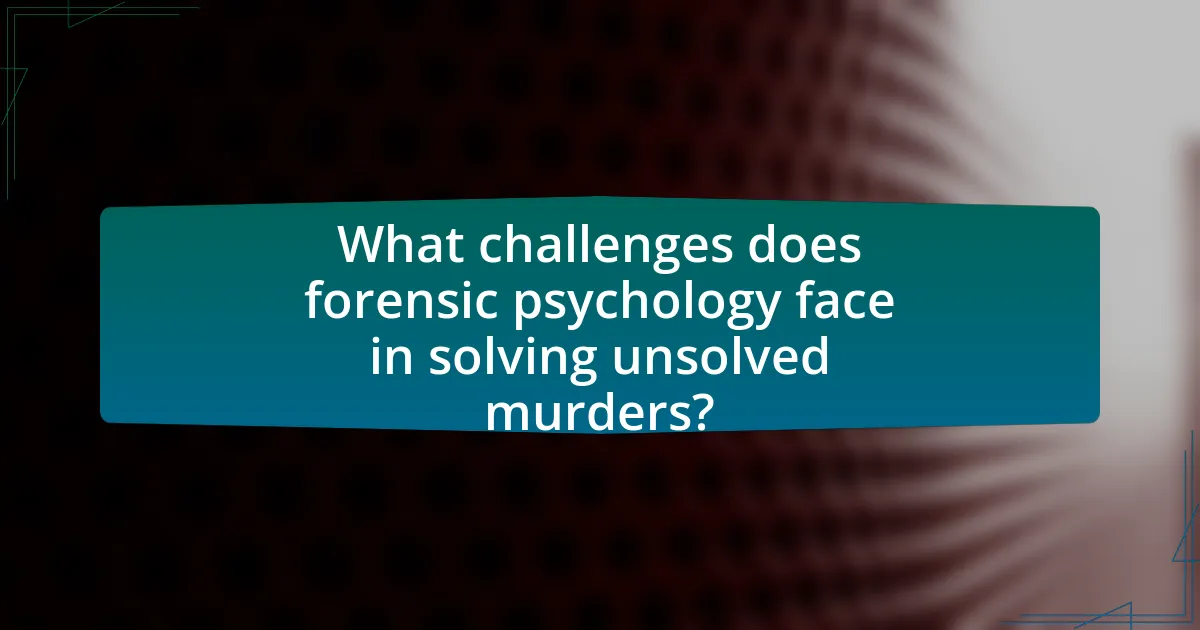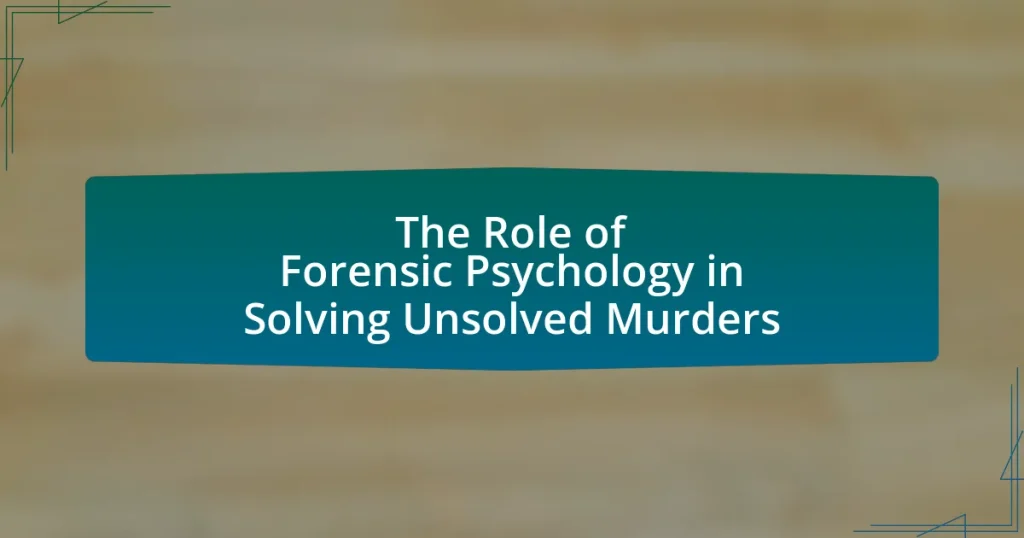Forensic psychology is a vital discipline in the investigation of unsolved murders, utilizing psychological principles to understand criminal behavior and assist law enforcement. This article explores how forensic psychologists contribute to criminal investigations through techniques such as profiling, behavioral analysis, and psychological assessments. It highlights the importance of these methods in identifying suspects and solving cold cases, while also addressing the challenges and ethical considerations faced by forensic psychologists. Additionally, the article discusses the collaborative approaches that can enhance the effectiveness of investigations, emphasizing the role of psychological insights in achieving justice for victims and their families.

What is the Role of Forensic Psychology in Solving Unsolved Murders?
Forensic psychology plays a crucial role in solving unsolved murders by applying psychological principles to criminal investigations. This discipline assists law enforcement in understanding the behavior and motivations of offenders, which can lead to the identification of suspects. For instance, forensic psychologists analyze crime scenes, develop profiles of potential suspects, and provide insights into the psychological state of the perpetrator, which can guide investigative strategies. Research indicates that psychological profiling can significantly enhance the chances of solving cold cases, as evidenced by cases where behavioral analysis has led to breakthroughs in investigations.
How does forensic psychology contribute to criminal investigations?
Forensic psychology contributes to criminal investigations by applying psychological principles to understand criminal behavior and assist law enforcement. This field aids in profiling suspects, which involves analyzing behavioral patterns and psychological traits to predict actions and motives. Research indicates that psychological profiling can enhance the efficiency of investigations; for instance, the FBI’s Behavioral Analysis Unit has successfully utilized profiling techniques in numerous high-profile cases, leading to the identification and apprehension of offenders. Additionally, forensic psychologists often provide expert testimony in court, helping juries understand the mental state of defendants, which can influence legal outcomes.
What techniques do forensic psychologists use in their assessments?
Forensic psychologists use various techniques in their assessments, including clinical interviews, psychological testing, and behavioral analysis. Clinical interviews allow psychologists to gather detailed information about an individual’s history, mental state, and behavior, which is crucial for understanding their psychological profile. Psychological testing, such as personality assessments and risk assessment tools, provides quantitative data that can help in evaluating an individual’s mental health and potential for future behavior. Behavioral analysis involves examining an individual’s actions and reactions in specific situations, which can offer insights into their motivations and thought processes. These techniques are validated through empirical research, demonstrating their effectiveness in forensic settings.
How do forensic psychologists collaborate with law enforcement?
Forensic psychologists collaborate with law enforcement by providing psychological insights that aid in criminal investigations. They assist in developing criminal profiles, which help law enforcement understand the behavior and motivations of suspects, thereby narrowing down potential leads. For example, forensic psychologists analyze crime scenes and victimology to identify patterns that may indicate the perpetrator’s psychological state. Additionally, they may conduct interviews with suspects and witnesses to assess credibility and gather information that can be crucial for case resolution. Their expertise in understanding human behavior enhances investigative strategies, ultimately contributing to solving unsolved murders.
Why is forensic psychology important in the context of unsolved murders?
Forensic psychology is important in the context of unsolved murders because it provides insights into the psychological profiles of offenders, which can aid in identifying suspects and understanding their motives. By analyzing behavioral patterns, forensic psychologists can develop profiles that help law enforcement focus their investigations on individuals who exhibit similar characteristics to known offenders. Research indicates that psychological profiling has been instrumental in solving cases; for example, the FBI’s Behavioral Analysis Unit has successfully used psychological insights to apprehend serial killers. This application of forensic psychology not only enhances investigative strategies but also increases the likelihood of resolving cold cases, thereby contributing to justice for victims and their families.
What insights can forensic psychology provide that traditional methods may overlook?
Forensic psychology can provide insights into the psychological motivations and behavioral patterns of offenders that traditional methods may overlook. This discipline utilizes psychological principles to analyze criminal behavior, offering a deeper understanding of the mental state and potential triggers for criminal actions. For instance, forensic psychologists can assess personality traits, mental health issues, and environmental factors that contribute to criminal behavior, which are often not considered in conventional investigative approaches. Research indicates that understanding these psychological aspects can lead to more effective profiling and investigative strategies, ultimately aiding in solving cases that remain unsolved due to a lack of psychological insight.
How does understanding criminal behavior aid in solving cold cases?
Understanding criminal behavior aids in solving cold cases by providing insights into the motivations, patterns, and psychological profiles of offenders. This knowledge allows investigators to develop targeted strategies for re-examining evidence and identifying potential suspects. For instance, behavioral analysis can reveal common traits among serial offenders, which can be applied to cold cases with similar characteristics. Research indicates that profiling techniques, such as those developed by the FBI, have successfully led to breakthroughs in previously unsolved cases by narrowing down suspect lists based on behavioral patterns.

What are the key methods used in forensic psychology for solving murders?
Key methods used in forensic psychology for solving murders include criminal profiling, psychological autopsies, and investigative interviewing techniques. Criminal profiling involves analyzing behavioral patterns and characteristics of offenders to predict their actions and identify potential suspects. Psychological autopsies reconstruct the mental state of victims prior to their death, providing insights into motives and circumstances surrounding the murder. Investigative interviewing techniques focus on eliciting accurate information from witnesses and suspects, utilizing strategies that enhance recall and reduce misinformation. These methods are supported by empirical research, such as studies demonstrating the effectiveness of profiling in narrowing down suspect lists and the role of psychological autopsies in understanding victimology.
How do psychological profiling techniques work?
Psychological profiling techniques work by analyzing behavioral patterns, personality traits, and demographic information to create a comprehensive profile of an individual, often a criminal. These techniques utilize data from crime scenes, victimology, and psychological theories to infer characteristics such as age, gender, and potential motivations of the offender. For instance, the FBI’s Behavioral Analysis Unit employs these methods, which have been validated through numerous case studies, demonstrating their effectiveness in narrowing down suspects and guiding investigations. Research indicates that profiling can significantly enhance the understanding of criminal behavior, aiding law enforcement in solving complex cases.
What are the steps involved in creating a psychological profile?
Creating a psychological profile involves several key steps: gathering information, analyzing behavior, identifying patterns, and formulating a profile. First, forensic psychologists collect data from crime scenes, victimology, and witness statements to understand the context of the crime. Next, they analyze the behavior exhibited during the crime, including methods and motivations, to identify psychological patterns. This analysis helps in recognizing traits and behaviors typical of certain types of offenders. Finally, the psychologist synthesizes this information into a comprehensive profile that outlines potential characteristics of the perpetrator, aiding law enforcement in narrowing down suspects. This methodical approach is supported by research indicating that psychological profiling can significantly enhance investigative strategies in criminal cases.
How effective is psychological profiling in identifying suspects?
Psychological profiling is moderately effective in identifying suspects, with success rates varying based on the context and application. Research indicates that profiling can assist law enforcement by narrowing down suspect lists and providing insights into behavioral patterns, but it is not infallible. A study published in the Journal of Forensic Sciences found that while profiling can lead to useful leads, it is most effective when combined with traditional investigative methods, yielding a success rate of approximately 60% in certain cases. This demonstrates that while psychological profiling can enhance investigations, it should not be solely relied upon for suspect identification.
What role does behavioral analysis play in forensic psychology?
Behavioral analysis plays a crucial role in forensic psychology by helping professionals understand the motivations and patterns of criminal behavior. This analytical approach allows forensic psychologists to create profiles of offenders, which can assist law enforcement in identifying and apprehending suspects. Research indicates that behavioral analysis can significantly enhance investigative strategies; for instance, the FBI’s Behavioral Analysis Unit has utilized this method to solve numerous high-profile cases, demonstrating its effectiveness in linking behavioral patterns to specific criminal acts.
How can behavioral patterns assist in narrowing down suspects?
Behavioral patterns assist in narrowing down suspects by providing insights into an individual’s actions, motivations, and psychological profiles. Forensic psychologists analyze these patterns to identify characteristics that align with known criminal behaviors, which can help law enforcement focus their investigations on individuals who exhibit similar traits. Research indicates that behavioral profiling can increase the likelihood of identifying suspects by up to 30%, as it allows investigators to create a more targeted approach based on the psychological and behavioral evidence gathered from crime scenes and victimology.
What are the limitations of behavioral analysis in solving murders?
Behavioral analysis has significant limitations in solving murders, primarily due to its reliance on subjective interpretations and the variability of human behavior. Behavioral analysts often face challenges in accurately predicting a suspect’s actions, as individual motivations and circumstances can differ widely, leading to potential misinterpretations. Additionally, the lack of empirical data supporting specific behavioral profiles can hinder the effectiveness of this approach. For instance, a study published in the Journal of Forensic Sciences highlighted that behavioral profiling does not consistently lead to accurate suspect identification, with success rates often below 50%. This indicates that while behavioral analysis can provide insights, it is not a definitive tool for solving murders.

What challenges does forensic psychology face in solving unsolved murders?
Forensic psychology faces several challenges in solving unsolved murders, primarily due to limitations in evidence, the complexity of human behavior, and the evolving nature of criminal investigations. The lack of physical evidence, such as DNA or eyewitness accounts, often hinders the ability of forensic psychologists to create accurate profiles of suspects. Additionally, the psychological factors influencing criminal behavior can be difficult to interpret, as motivations and mental states vary widely among individuals. Furthermore, advancements in technology and investigative techniques can outpace the application of psychological insights, making it challenging for forensic psychologists to remain relevant in the evolving landscape of criminal justice. These factors collectively complicate the process of solving cold cases and require ongoing adaptation and collaboration with law enforcement agencies.
How do biases affect forensic psychological assessments?
Biases significantly affect forensic psychological assessments by influencing the evaluator’s interpretation of data and the conclusions drawn. For instance, confirmation bias may lead an evaluator to favor information that supports their preconceived notions about a suspect, while disregarding contradictory evidence. Research indicates that biases can result in misdiagnoses or inaccurate risk assessments, ultimately impacting legal outcomes. A study published in the journal “Psychological Science in the Public Interest” highlights that biases can skew the objectivity required in forensic evaluations, leading to potential miscarriages of justice.
What measures can be taken to minimize bias in forensic psychology?
To minimize bias in forensic psychology, implementing standardized assessment tools and protocols is essential. Standardized tools reduce subjectivity by providing consistent criteria for evaluations, which can help ensure that conclusions are based on objective data rather than personal beliefs or experiences. Research indicates that the use of structured interviews and validated psychological assessments can significantly decrease the influence of cognitive biases, as shown in studies like those conducted by the American Psychological Association, which emphasize the importance of evidence-based practices in forensic settings. Additionally, ongoing training and education for forensic psychologists about potential biases and their impacts can further enhance objectivity in evaluations.
How does the legal system impact the application of forensic psychology?
The legal system significantly impacts the application of forensic psychology by establishing the framework within which psychological assessments and expert testimonies are utilized in criminal cases. Forensic psychologists operate under legal standards and guidelines that dictate how psychological evaluations are conducted, the admissibility of their findings in court, and the ethical considerations they must adhere to. For instance, the Daubert standard requires that expert testimony be based on scientifically valid reasoning, which directly influences how forensic psychologists formulate their assessments and present their findings. This legal framework ensures that forensic psychology contributes effectively to the judicial process, aiding in the evaluation of competency, risk assessment, and understanding criminal behavior, thereby enhancing the overall efficacy of investigations into unsolved murders.
What ethical considerations must forensic psychologists keep in mind?
Forensic psychologists must prioritize confidentiality, informed consent, and the avoidance of dual relationships. Confidentiality is crucial as it protects the privacy of individuals involved in legal cases, ensuring that sensitive information is not disclosed without consent. Informed consent requires psychologists to clearly communicate the nature and purpose of their assessments, allowing individuals to make educated decisions about their participation. Avoiding dual relationships is essential to maintain professional boundaries and prevent conflicts of interest that could compromise the integrity of the psychological evaluation. These ethical considerations are supported by the American Psychological Association’s Ethical Principles of Psychologists and Code of Conduct, which emphasizes the importance of ethical practice in all psychological work, particularly in sensitive forensic contexts.
How do confidentiality and consent play a role in forensic assessments?
Confidentiality and consent are critical components in forensic assessments, as they ensure that the information gathered from individuals is protected and that individuals are aware of how their information will be used. Confidentiality safeguards the privacy of the assessed individuals, which is essential for building trust and encouraging honest communication during evaluations. Consent, on the other hand, is necessary to obtain permission from individuals before conducting assessments, ensuring that they understand the purpose and potential implications of the evaluation. Research indicates that maintaining confidentiality and obtaining informed consent are fundamental ethical principles in forensic psychology, as outlined by the American Psychological Association’s Ethical Principles of Psychologists and Code of Conduct. These principles help to uphold the integrity of the assessment process and protect the rights of individuals involved.
What are the potential consequences of unethical practices in forensic psychology?
Unethical practices in forensic psychology can lead to significant consequences, including wrongful convictions, compromised legal proceedings, and damage to the credibility of the psychological profession. Wrongful convictions occur when biased or flawed psychological evaluations influence jury decisions, resulting in innocent individuals being sentenced. For instance, the case of Michael Morton, who was wrongfully imprisoned for nearly 25 years due to unreliable witness testimony and inadequate psychological assessments, highlights the severe impact of unethical practices. Additionally, compromised legal proceedings can arise when forensic psychologists fail to adhere to ethical guidelines, leading to unreliable testimony that undermines the judicial process. This can erode public trust in the legal system and the professionals involved. Furthermore, unethical behavior can tarnish the reputation of forensic psychology as a discipline, making it difficult for ethical practitioners to be taken seriously in court.
What practical strategies can forensic psychologists employ to enhance their effectiveness?
Forensic psychologists can enhance their effectiveness by employing evidence-based assessment techniques, utilizing structured interviews, and engaging in continuous professional development. Evidence-based assessment techniques, such as the use of standardized psychological tests, provide reliable data that can inform case evaluations and decision-making. Structured interviews, which follow a predetermined format, ensure consistency and comprehensiveness in gathering information from witnesses and suspects, thereby reducing bias. Continuous professional development, including attending workshops and training on the latest forensic psychology research, equips psychologists with updated knowledge and skills, enabling them to apply the most current practices in their work. These strategies collectively improve the accuracy and reliability of forensic psychological evaluations, ultimately contributing to more effective outcomes in solving unsolved murders.
How can ongoing training improve the skills of forensic psychologists?
Ongoing training can significantly enhance the skills of forensic psychologists by keeping them updated on the latest research, techniques, and legal standards in the field. Continuous education allows forensic psychologists to refine their assessment methods, improve their understanding of criminal behavior, and stay informed about advancements in psychological theories and practices. For instance, training programs often include workshops on new forensic assessment tools and methodologies, which can lead to more accurate evaluations and testimonies in court. Additionally, ongoing training fosters collaboration with other professionals, enhancing interdisciplinary approaches to solving cases, as evidenced by studies showing that integrated training improves case outcomes in forensic settings.
What collaborative approaches can be adopted to solve unsolved murders more effectively?
Collaborative approaches to solving unsolved murders more effectively include the establishment of multi-agency task forces that integrate law enforcement, forensic experts, and mental health professionals. These task forces can leverage diverse expertise to analyze evidence, develop psychological profiles of suspects, and utilize advanced forensic techniques. For instance, the FBI’s Behavioral Analysis Unit collaborates with local police departments to provide insights based on psychological profiling, which has proven effective in several high-profile cases. Additionally, community engagement initiatives that encourage public participation can lead to new leads, as seen in the case of the Golden State Killer, where citizen involvement through online platforms contributed to the eventual arrest.


